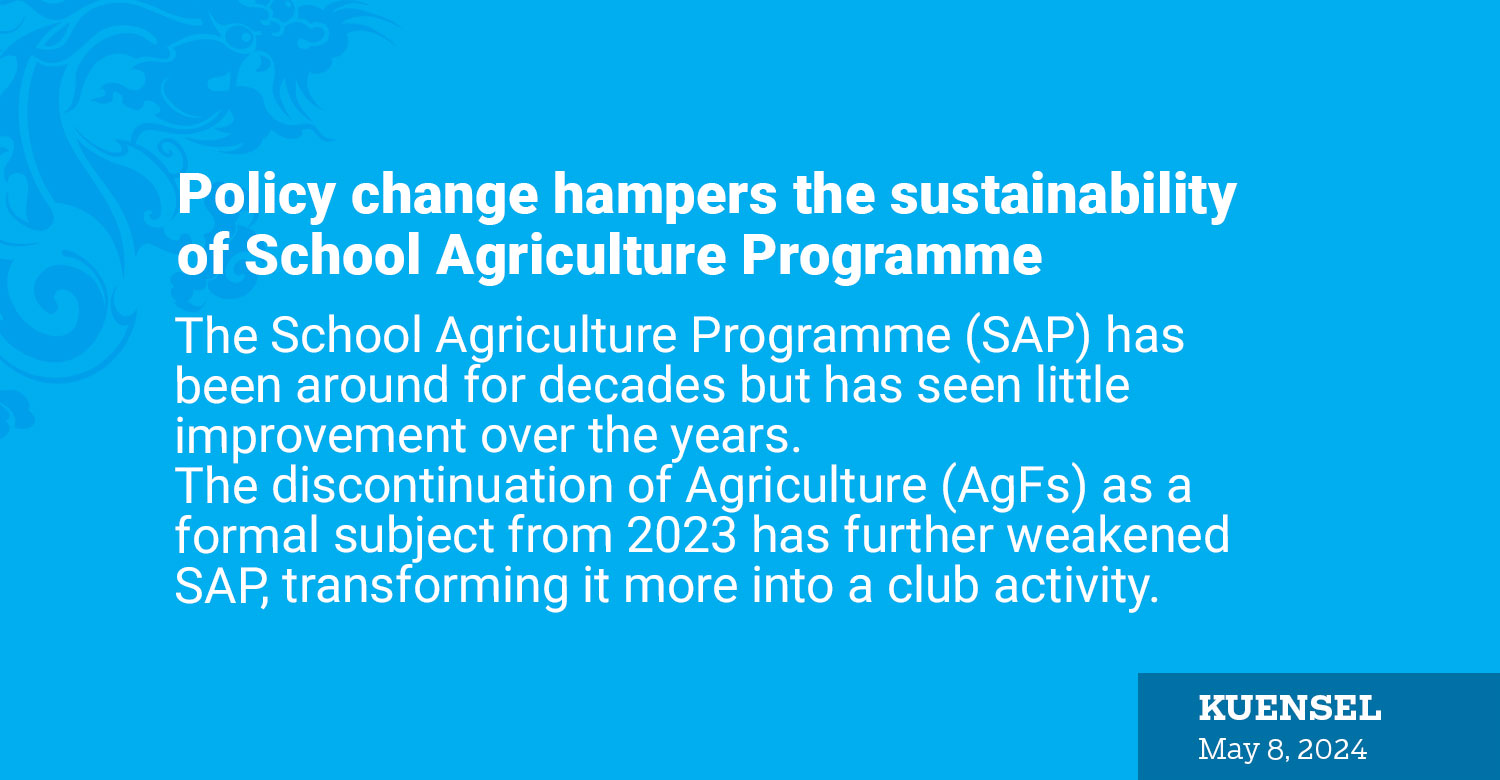
The School Agriculture Programme (SAP) has been around for decades but has seen little improvement over the years.
The discontinuation of Agriculture (AgFs) as a formal subject from 2023 has further weakened SAP, transforming it more into a club activity.
According to Dzongkhag Agriculture Officers (DAOs) at a recent workshop organised by the Food and Agriculture Organization (FAO), SAP has lost its importance over time.
The DAOs also highlighted the confusion about which ministry, Education and Skill Development or Agriculture and Livestock oversees SAP.
Some schools and dzongkhags support the programme but SAP overall struggles due to budget shortfalls.
In the past, budgets remained at the dzongkhags to plan for activities but this has stopped, making it difficult for schools to fully run SAP activities.
Schools often request seeds and equipment but some dzongkhags have halted this due to budgetary issues.
Reports indicate that some school agriculture plots lie idle, while others have been repurposed for construction.
However, some schools have made significant progress in using the plots and achieving the expected outcomes.
There is an ongoing debate among stakeholders regarding whether SAP should prioritise mass commercial production or focus solely on teaching students basic skills.
Some support mass production to benefit school feeding programmes in boarding schools, making SAP more relevant.
The data with the Ministry of Education and Skill Development shows that 47 schools provide one meal, 353 provide two meals, 182 provide three meals and 63 central schools provide just one meal.
In addition, there are calls to adapt to technology-based farming to align with current needs and discussion about using SAP as a platform for students to learn and disseminate modern farming information to villages.
An official from MoESD clarified that SAP falls under its purview with a dedicated unit managing its operations.
Despite the challenges, the ministry is committed to addressing them in the 13th plan, according to an official.
The official stressed the importance of integrating production and learning within SAP, stating that production can contribute to maintaining student nutrition, especially in boarding schools.
Further, the official highlighted ministry’s initiatives aimed at strengthening SAP, such as 75 mini power tillers being distributed to different schools based on the progress of SAP.
According to the official, each power tiller costs about 50 thousand Nu, and the ministry has proposed an additional budget for purchasing agricultural tools, greenhouses, fencing and other equipment which would be distributed to the schools.
An agricultural expert with experience in SAP suggested schools to prioritise skill development over commercial or mass production.
“Schools should keep the agriculture curriculum at the basic level and carry out small land farming by students as an experiential learning experience,” he added.
Regarding the potential of SAP to contribute to feeding schools, he expressed concern that if schools pursue mass production, it could negatively impact farmers, as they rely on schools as a suitable market for their produce.
Limiting the market for farmers could have adverse effects on their market scope, as schools typically purchase large quantities of vegetables and livestock products.
The Department of Agriculture and Marketing Cooperative (DAMC) serves as the intermediary agency connecting farmers with schools.
This connection ensures that schools have access to perishable food items, benefiting them in the long run by providing a reliable market for fruits and vegetables.
Such an arrangement helps support both farmers and schools, creating a mutually beneficial relationship that contributes to food security and sustainability.
When questioned about the suitability of adopting tech-based farming at school level, the expert said it is important to focus on acquiring professional-level farming skills, particularly in high-tech and precision agriculture.
However, he added that high-tech farming may not be necessary at the school level. Instead, he suggested it could be introduced at the college level, where students have already decided to pursue a career in agriculture.
This approach ensures that students receive appropriate training and exposure to technology relevant to their future careers.












